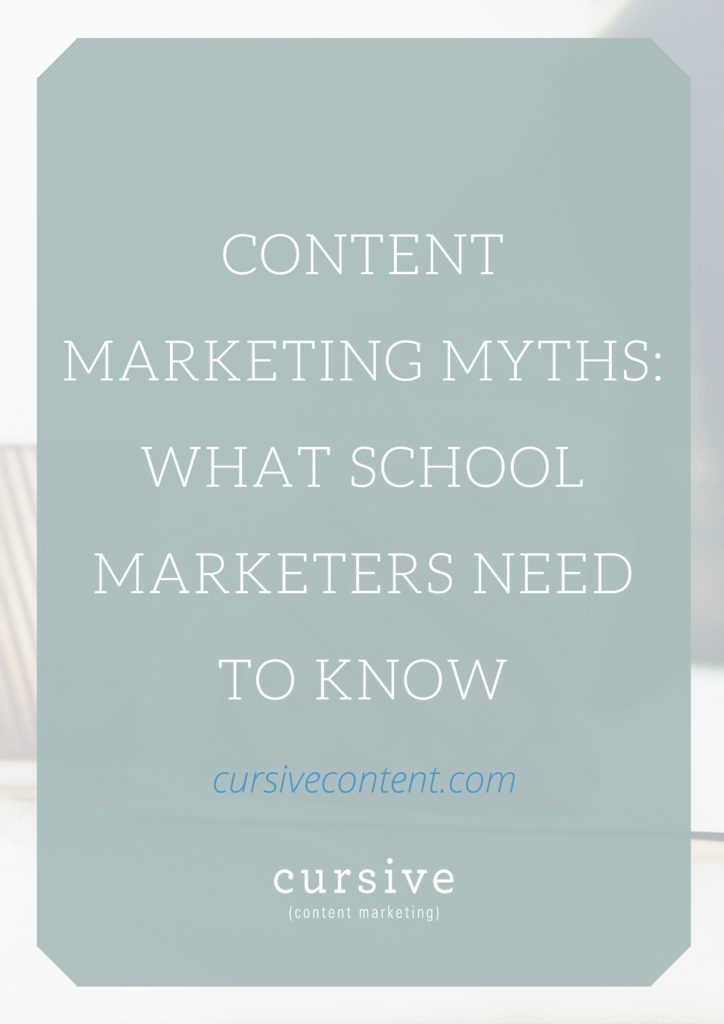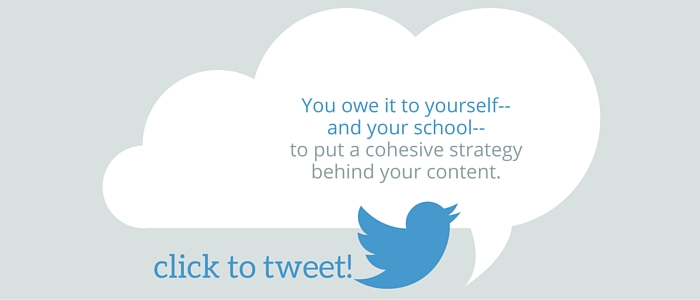Content Marketing Myths: What School Marketers Need to Know
Despite the incredible success that content marketing has brought to businesses, organizations and schools worldwide, the approach still meets resistance.
This has a lot to do with the myths that surround content marketing.
Those untruths scare well-intentioned marketers away; make them doubt, hesitate and resist. So instead of wondering and worrying, let’s debunk those myths, shall we?
Here are some of the most common content marketing myths we’ve heard, and our rebuttal to the rumors.

“Content marketing is a fad.”
Nobody loves the next big thing more than marketers. And if you’ve ever been responsible for jumping on a marketing must-have that ends up being a marketing fail (QR codes, anyone?), chances are you’re hesitant to repeat that mistake.
I totally understand the instinct to hold off on new and unproven marketing tactics—and I’m also happy to tell you marketing is not one of them.
Content marketing is a new-ish term for an old practice—the earliest example of content marketing is from 1867, when the Hartford Steam Boiler & Inspection Company started a publication that allowed its customers to solve problems and mitigate risk.
And more brands followed.
Created in 1904, Jell-O’s free recipe book helped them exceed $1 million in sales by 1906.
Fast-forward to 1982, when Hasbro and Marvel joined together to launch G.I. Joe comic books.
And on and on and on until today.
In fact, those early content marketing efforts from Hartford Steam Boiler and Jell-O have evolved over time and still exist. New format, same content marketing philosophy.
With nearly 150 years of history, this is one myth that’s easy to debunk. Content marketing is no fad.
Here are more examples of powerhouse content marketing:
- 4 Independent Schools with A+ Content Marketing
- How Storytelling & Digital Marketing Helped This University Increase Enrollment by 41%
- Content Marketing Barbie: Authentic Storytelling Lessons from a Plastic World
- Is Disney the World’s Best Content Marketing Brand?
“We have a blog, so we’re already taking a content marketing approach.”
Not so fast, friend. Having a blog does not automatically make you a content marketer.
A blog is just content.
If that blog is designed to engage your target audience and guides them to take a specific action that helps support your school’s goals—then you’re content marketing.
In other words, a content marketing approach is less about the tactics involved and more about the strategy behind those tactics. In the words of Content Marketing Institute (the ultimate authority on all things content marketing):
“Content marketing is a strategic marketing approach focused on creating and distributing valuable, relevant, and consistent content to attract and retain a clearly-defined audience—and, ultimately, to drive profitable customer action.”
To understand more about the difference between producing content and content marketing, read:
- Is It Content Marketing, Or Is It Just Content?
- From Interested to Enrolled: How to Create Content for Every Step of the Journey
- The Undeniable Reason You Need to Document Your Content Marketing Strategy—Today

“The more content we create, the more successful we’ll be.”
Let’s do a quick exercise.
You have the choice to read one of two blogs.
Blog A publishes 3 new posts per week on topics you’re interested in. Sometimes you enjoy the articles and find them helpful, but other times you feel like reading them was a waste of your time. You never know quite what you are going to get.
Blog B publishes once per week on topics you’re interested in, and each post is insightful, smart and interesting. You know that every time Blog B posts something new, it’s something you want to read.
Now…who’s the bigger success here? Blog A, because they post three times the content? Or Blog B, because they always produce great content?
Clearly Blog B, right?
In the quantity versus quality conundrum, quality will always win with audiences.
No one—students, parents, alumni, faculty—needs MORE content. What they do need is better content.
So if you’re holding off on content marketing because you think you need to publish as frequently as The New York Times, or if you’ve been stressing yourself out trying to keep up with a crazy posting schedule—take a deep breath. It is possible to create an impactful content marketing plan that includes the amount of content that is manageable for your school.
Read more about creating quality content:
- 3 Ways to Pack Valuable Content Into Overlooked School Communications
- How Do You Know If Your School Is Writing Quality Content?
- What Makes Marketing Content Valuable?
- Quick Tips: 4 Ways to Improve Your School’s Emails Right Now
- The Essential Editorial Calendar for Schools
“If we implement a content marketing approach, it means we have to be on [insert social network here].”
Social media can be really overwhelming, especially because schools need to connect with younger generations— the same generations that are likely to jump on the latest social network.
This can often leave schools confused about where to best direct their efforts.
The complete answer is different for everyone but the short answer is the same: The best networks for your school are the ones your audience is actively using and that you have the capacity to manage.
So, no, you do not have to be on any specific social networking site. You’re better off mastering one network before adding any others.
And you don’t need to worry about creating a presence on the newest social networks immediately—if you’re not prepared to take on something new, don’t. Sit back and carefully watch how other marketers and your audience use the network before diving in.
Get more social media tips for schools:
- Social Media for Schools: 5 Tips for Working Smarter, Not Harder
- 20 Best Tips for Connecting with Your Social Media Audience
- Social Proof: What Is It, and How Can School Marketers Use It?
“We don’t have time for content marketing.”
If your school is on social media, has a blog, produces other forms of online content, prints brochures, attends in-person events or has a website, you have content.
You owe it to yourself—and your school—to put a cohesive strategy behind that content.
What content marketing can and should do is tie together all those disparate pieces of content that you produce. The shift to a content marketing approach will help you put meaning behind why you have that blog and why you create that brochure, along with who you’re trying to reach, and what success looks like.
When your content is backed by strategy, you have a clear direction that helps save time and wasted efforts.
So while I can’t tell you for sure that you there is enough time in your day for content marketing, I can promise it’s not as overwhelming as it might seem.
Learn more about the importance of content marketing strategy—plus some time-saving content marketing hacks to help you fit content marketing into your busy schedule.
- Finding Time for Content: 4 Quick Tips
- Time Management Tips for the Busy Marketer
- Should You Hire or Outsource for Content Marketing Success?
- Don’t Have Time to Blog? Write a Book.
Tell us in the comments below—why haven’t you adopted a content marketing approach? We’d love to know what’s holding you back—behind your reason there might just be a content marketing myth that we can debunk.
MORE ARTICLES
-
 What Is Your Private School’s Bold & Unifying Big Promise?
What Is Your Private School’s Bold & Unifying Big Promise? -
 AI Writing Prompts to Power Private School Storytelling
AI Writing Prompts to Power Private School Storytelling -
 When to Outsource Your Private School Content Marketing to an Expert
When to Outsource Your Private School Content Marketing to an Expert -
 3 Unique Ways to Attract Dream Families with Content
3 Unique Ways to Attract Dream Families with Content -
 4 Quick & Easy Ways to Improve Your School’s Emails
4 Quick & Easy Ways to Improve Your School’s Emails -
 The Best Content Marketing Resources for Independent Schools
The Best Content Marketing Resources for Independent Schools -
 How to Create Qualified Leads for Your Private School
How to Create Qualified Leads for Your Private School -
 10 School Storytelling Mistakes That Cause Your Audience to Disconnect
10 School Storytelling Mistakes That Cause Your Audience to Disconnect
